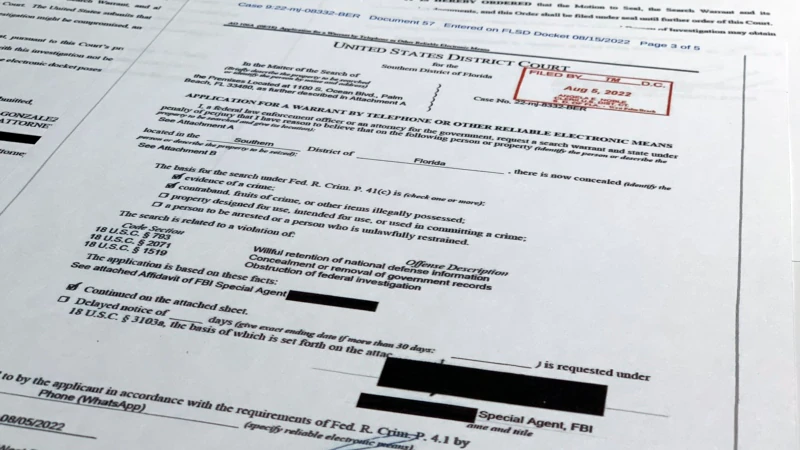A federal judge directed the Justice Department late Thursday to unseal its redacted version of an affidavit it used to obtain a search warrant for classified records at former President Donald Trump’s Florida estate.
Magistrate Judge Bruce Reinhart’s order came after the Justice Department earlier in the day proposed redactions to the secret document, which lays out the legal justification for searching Trump’s property as part of an ongoing investigation of the former president’s handling of classified government documents.
In his order, Reinhart wrote that he had reviewed the redacted affidavit and found that “the Government has met its burden of showing that its proposed redactions are narrowly tailored to serve the Government’s legitimate interest in the integrity of the ongoing investigation and are the least onerous alternative to sealing the entire Affidavit.”
The affidavit is being sought by several U.S. news organizations and other groups.
The Justice Department had opposed making the document public, saying it contains critical details about the ongoing investigations, including information about the government’s investigative techniques and witnesses interviewed by the FBI.
Reinhart gave the Justice Department until noon Friday to submit the affidavit.
The August 8 search of Mar-a-Lago set off a political firestorm, prompting Trump and his allies to accuse the Biden administration of “weaponizing” the Justice Department and the FBI.
Attorney General Merrick Garland, who authorized the Justice Department to seek a search warrant for Mar-a-Lago, has dismissed the accusation.
During the search, FBI agents removed 11 sets of classified documents labeled confidential, secret or top secret, according to a property receipt given to Trump’s lawyer.
The content of the documents remains uncertain. But the information was deemed sensitive enough that Garland personally intervened in the case.
The search came months after Trump turned over to the National Archives 15 boxes of government records that he’d taken to Mar-a-Lago after leaving the White House in January 2021.
Under the Presidential Records Act, all presidential records are the property of the U.S. government and must be turned over to the National Archives by outgoing presidents.
In a May 10 letter to a Trump lawyer, acting U.S. archivist Debra Wall wrote that the boxes included more than 100 classified documents consisting of more than 700 pages. The National Archives released the letter this week.
The FBI investigation of Trump’s handling of classified records represents the latest legal headache for the former president as he mulls running again in 2024.
In the 21 months since he lost his re-election bid in November 2020, Trump has been under investigation by congressional investigators and prosecutors for his efforts to overturn the results of the vote.

